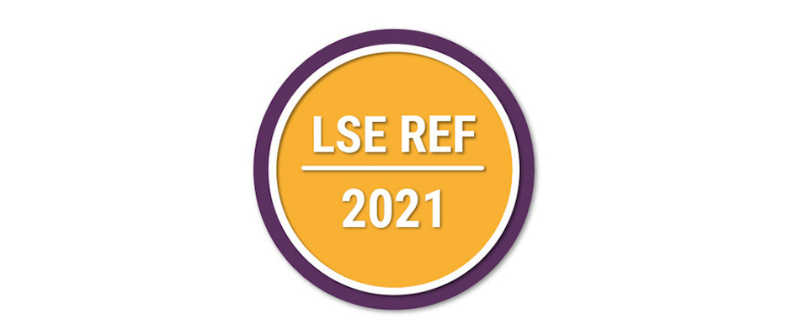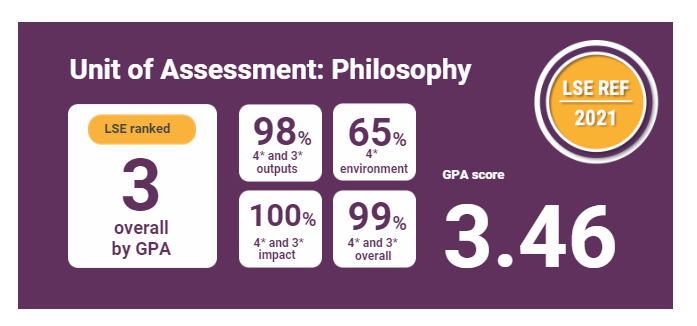Our outstanding contributions to the field have been recognised by assessors in the 2021 Research Excellence Framework [REF].
Results
LSE Philosophy was ranked joint 3rd overall in the UK in the REF (by GPA) for the quality and impact of our research and for the quality of our research environment. A stunning 98% of the research we submitted was judged to be world leading or internationally excellent in terms of originality, significance and rigour; testimony to the depth of the research capacity of the department.
Impacts
The very substantial contributions of our research to society were also recognised, with all of the case studies documenting the social impact of our work being rated as excellent.
The impact of our research outside of academia is exemplified by the work of Professor Alex Voorhoeve in helping shape the World Health Organization’s report Making Fair Choice of the Path to Universal Health Coverage, and by Professors Richard Bradley and Roman Frigg in their Managing Severe Uncertainty project.
Making Fair Choice of the Path to Universal Health Coverage
Universal health coverage is a priority for the World Health Organization (WHO) and part of the United Nations’ 2015 Sustainable Development Goals. However, because of resource constraints, countries must make difficult choices when making efforts to improve healthcare provision and achieving universal coverage.
In response to requests from more than 70 countries, in 2012 the WHO founded its Consultative Group on Equity and Universal Health Coverage to provide guidance on how to make these choices fairly – that is, in accordance with compelling principles of justice. This guidance needed to balance different perspectives on principles for determining healthcare priorities. Professor Alex Voorhoeve, an expert in distributive justice, joined the group alongside 17 other philosophers, economists, health policy experts, and clinical doctors of 13 nationalities.
The group’s final report was published in 2014. It was endorsed in full by the Director-General of the WHO and has guided priority setting advice and training by the WHO and its member organisations, including especially the Pan-American Health Organization (PAHO) ever since. Its principles have demonstrably shaped decision-making by governments and public bodies in many countries, including Argentina, Ethiopia and Norway.
Drawing on his well-known research, Alex Voorhoeve was a key voice advocating that the report adopt pluralist egalitarian principles: integrating and balancing the concerns of utilitarians and relational egalitarians, while supplementing them with the distributive egalitarian aim of reducing inequality in both expected wellbeing and wellbeing outcomes. His input substantially shaped the Report and the way it was subsequently received in the academic community and among health policy professionals.
Managing Severe Uncertainty
How do you price insurance against natural hazards?
Prevailing practice in the insurance industry is to design mathematical models to estimate the likelihood of natural catastrophes, such as hurricanes and earthquakes, and of the vulnerability of insured assets to them. This allows companies to determine their exposure to losses arising from such an event and use these projections to calculate insurance premiums and the capital holdings they require to keep the risk of ruin below the level required by national regulators. However, because of the sparsity of data concerning extreme events and the complexity of the underlying physical processes, these models are highly uncertain, and their projections are not fully trusted by insurance underwriters.
Professor Richard Bradley and Professor Roman Frigg have developed a body of work on scientific uncertainty and its implications for decision-making, which was brought together in their project “Managing Severe Uncertainty”. This work has reshaped the way in which decision-making in situations of extreme uncertainty are addressed in both the insurance industry and the financial sector.
Since 2016, Bradley and Frigg have worked with the insurance company AXA XL, which provides insurance and risk management services for mid-sized to large companies, and their work been influential in introducing new ways that the insurer thinks about aspects of its decision-making under uncertainty. This new approach has allowed AXA XL to include a realistic and substantiated risk premium in its contracts, thereby avoiding ad-hoc adjustments in pricing, protecting against under-selling policies, and ensuring that prices are equitable and grounded in a reasoned assessment of the relevant uncertainties.
Further information about LSE’s performance in REF 2021 is available on The School’s main website.
The Research Excellence Framework (REF) is the system by which the UK’s higher education funding bodies assess the quality of research in publicly funded UK higher education institutions (HEIs). REF 2021 comprised three elements:
- academic outputs, comprising a portfolio based on the FTE of REF-eligible staff submitted;
- research impact, submitted as a number of impact case studies (ICSs) in proportion to the total FTE of REF-eligible staff submitted;
- research environment, comprising the total number of research degrees awarded between 2014 and 2020, total research income received over the same time period, and an environment statement detailing how the submitting unit(s) supported research and impact over the period.
Outputs, impact and environment were weighted 60:25:15 respectively. All three elements were graded on a scale from 0 (unclassified) to 4* (world leading) and the results were published as quality profiles showing the percentage of outputs, impact and environment considered to meet each of the starred levels. Submissions were invited to 34 Units of Assessment (UoAs); LSE made 15 submissions to 13 UoAs across the SHAPE subjects.
For REF2021, HEIs were required to submit research outputs by all eligible members of staff. Each submitted member of staff could submit between one and five outputs, with the total number of outputs per UoA calculated as total FTE of staff multiplied by 2.5
Staff were eligible for REF2021 where they were on a teaching-and-research or research-only contract of at least 0.2 FTE on 31 July 2020 and had a substantive connection to the submitting HEI. Research-only staff also had to be classified as independent researchers. HEIs were also required to identify which eligible staff had significant responsibility for research. LSE submitted 100% of its staff meeting these definitions, but other HEIs had eligible staff who did not have significant responsibility for research and hence had a submission rate of less than 100%.
See here for a full glossary of REF terminology.




Connect with us
Facebook
Twitter
Youtube
Flickr